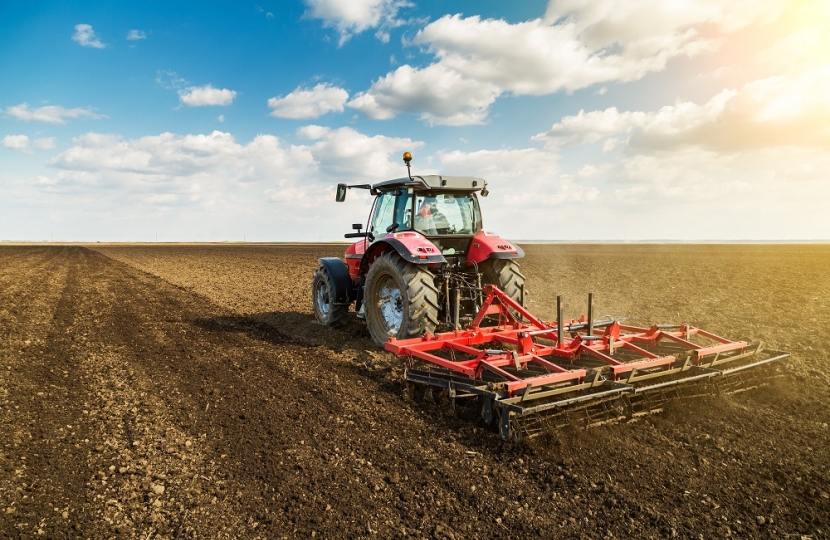
The government have announced plans to extend the Trade and Agriculture Commission (TAC) and place it on a full statutory footing, giving farmers a stronger voice in UK trade policy.
The Conservatives were elected on a clear manifesto commitment that not to compromise on our food and animal welfare standards. The government has always been clear that any future trade agreements must work for consumers, farmers, and businesses in the UK.
As part of their work on this goal, the government launched the Trade and Agriculture Commission (TAC) to advise the government on its trade policies to ensure that standards are not undermined and to identify and secure new export opportunities. It was initially launched in July for a six-month period to inform top-level trade policy and negotiations. It has heard from dozens of experts on farming, animal welfare, the environment and trade, and has engaged with farmers, producers, businesses and MPs across the UK through a series of virtual regional roadshows.
Due to its success, the government has decided to extend the Commission past its previous fixed term and give it a more active role through a new legislative underpinning, to be reviewed every three years.
Crucially, each time the government hopes to sign a new free trade deal after the end of the Transition Period on 1st January 2021, there will be a duty to report on the impact of UK trade agreements on maintaining existing standards. These reports will then be laid in Parliament before the start of the 21-day scrutiny period under the terms of the Constitutional Reform and Governance Act. This means that MPs will have access to independent and expert advice when reviewing the impact of each trade deal on farming, before choosing how to vote.
Welcoming the news, James said -
"This is an important welcome step for British farmers who are concerned about future trade deals to increase parliamentary scrutiny without the damaging impacts of previous amendments that Parliament rejected.
This strengthens e government have demonstrated their sincere commitment to high food standards, animal welfare and agriculture in the UK."
The move has been welcomed by the NFU and its President Minette Batters said the decision 'will be hugely welcomed by Britain's farmers'.
The Commission is currently writing a report that will advise on:
- Trade policies the Government should adopt to secure opportunities for UK farmers, to ensure that animal welfare, food production and environmental standards are not undermined and to identify new export opportunities.
- Advancing and protecting British consumer interests and those of developing countries.
- How the UK engages the WTO to build a coalition that helps advance higher animal welfare standards across the world.
- Developing trade policy that identifies and opens up new export opportunities for the UK agricultural industry – in particular for SMEs – and that benefits the UK economy as a whole.
The Commission is publishing an interim report shortly, and the full report will be published in February 2021 and presented to Parliament.
Maintaining strong food and animal welfare standards
The government have been working hard to ensure the UK's food and agriculture standards are maintained and improved as much as possible. Recent policies have included:
- maintaining existing protections in law through the EU Withdrawal Act;
- ensuring all government departments, agencies and bodies continue to ensure standards are met including the Food Standards Agency, Food Standards Scotland, the Animal and Plant Health Agency, The Veterinary Medicines Directorate and Health and Safety Executive;
- repatriating the functions of audit and inspection currently carried out by the European Commission to ensure that trading partners continue to meet our import conditions and verifying that requirements are carried out as stipulated through checks at the border;
- committing to a serious and rapid examination of what can be done through labelling, to promote high standards and high welfare across the UK market, and to consult on this at the end of the transition period;
- enhancing stakeholder involvement in trade policy and negotiations through the renewed Agri-Food Trade Advisory Group;
- laying our negotiating objectives and scoping assessments in Parliament ahead of the start of negotiations;
- updating the House after each round of trade negotiations;
- providing copies of our first completed deal with Japan to the relevant committees to scrutinise;
- establishing the Trade and Agriculture Commission to advise the government on its trade policies to ensure that standards are not undermined and to identify and secure new export opportunities;
- amending the Trade and Agriculture Bills to give a stronger voice to farmers;
- creating a duty to report on the impact of UK trade agreements on maintaining existing standards builds on our commitments to transparency ahead of the ratification process and accountability for what has been negotiated. This will provide Parliamentarians with clear, additional information – including from the Trade and Agriculture Commission – to inform their decisions under the CRaG process, enhancing their ability to scrutinise future free trade deals;
- amending the Trade Bill to put the Trade and Agriculture Commission on a statutory footing will place the UK farming, food and drink industry at the heart of trade policy and allow Parliamentarians access to independent and expert advice when reviewing the impact of each trade deal on farming.

